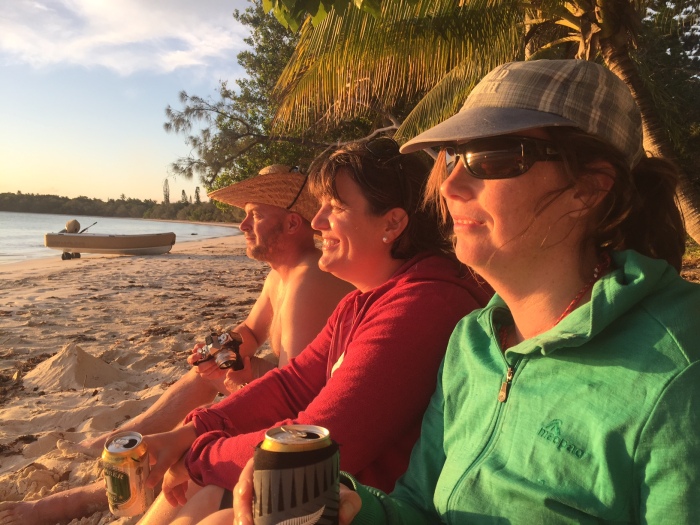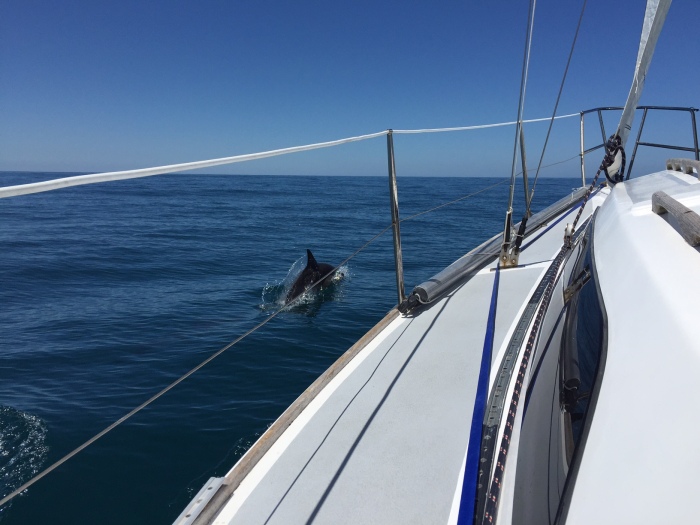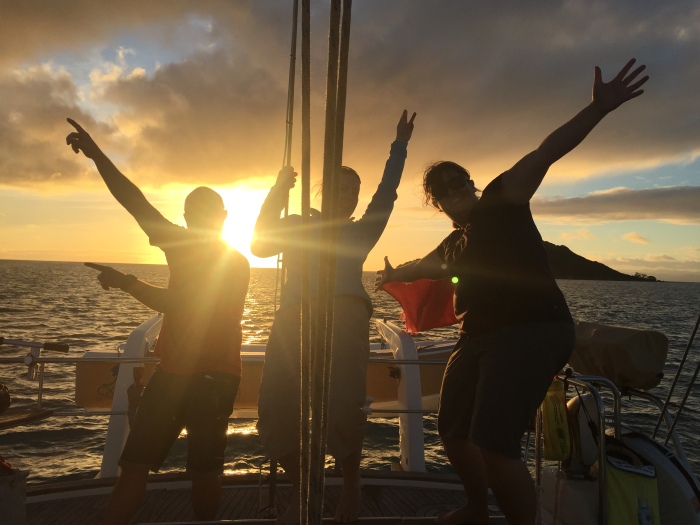When you are out in the middle of nowhere, it is so good knowing that you have got people back home who are able to assist when you need them.
We were recently sailing in New Caledonia, and were anchored inside a small reef and the sun was going down. It was a lovely spot, but there were dark clouds on the horizon, and the wind was increasing. We really just wanted to know what the marine forecast was for the next 24 hours, and some reassurance. We had no internet connection, but were able to send a quick text to a sailor friend back home. He checked PredictWind for us and reported back with exactly what we needed to know.
Thankfully the forecast was what we were hoping it would be, and despite it blowing hard all night, and the anchor alarm going off twice, we had a good night.

Having someone capable back at home in situations like this is fantastic. It is also essential when you are in trouble somewhere and are hoping to be rescued.
It struck me that while we were away on Esther Louise, that no one back home really knew where we were, which boat we were on, where we were going, when we were due back, or the emergency contact details of our other friends on the boat. We had told Herve, our friend in Noumea our rough plans, but he didn’t know our families contact details and neither did Jay the boat owner, who was back in New Zealand.
Had we set off the boat’s EPIRB, the person on Jay’s call list would have been advised that we were in trouble, but they wouldn’t have known how to contact our families to let them know what was going on. I am sure they would have eventually figured it out, but it wouldn’t have been easy.

We recently visited the Rescue Coordination Centre and Maritime Radio in Wellington. They provide a fantastic service rescuing not only sailors in our part of the world but also assisting Rescue Centres in other parts of the world if a New Zealand based boat needs assistance.
If we set off our EPIRB they would know immediately which boat was in trouble, along with the other information, such as emergency contact details we provided when we registered the beacon. Pretty soon after that they would also know our location. But other than that, this is pretty much all they have got to go on until they pick up the phone…

So consider this, what if you set off your EPIRB, and the Rescue Coordination Centre picks up the phone to speak to the first person on your call list. Who are they going to speak to? And is that person going to be able to pass on any vital information to assist with your rescue?
Or what if you are overdue, no one has heard from you for a while, and you are bobbing about in your liferaft hoping that eventually someone, anyone will raise the alarm…?
The contact details on my EPIRB registration are my Mum, Dad, brother and yacht club. They are all pretty likely to know where I am, and of course they are going to want to do all they can to assist with our rescue, but unless you have left them with some specific details, this may be very difficult for them to do.
My Mum isn’t a sailor, and a phone call to her is probably just going to send her in to a panic. So to make your emergency contact person’s life a lot easier, you could consider leaving a folder with the following information, all of which can give the Rescue Coordination Centre valuable pieces of the puzzle.
- A Trip Report – Details of the port you are leaving, the port you are heading to, your route, any potential places you are planning or could potentially stop at along the way, the charts you have on board, and your estimated time of arrival. Perhaps you could send through a copy of your Passage Plan. How will you contact them when you arrive or to advise you are ok? Will you be making Trip Reports on the radio as you sail along? These details will obviously be changing for each trip, so this information could just be in the form of an email to your emergency contacts before you head off. Without this information and if someone is overdue, any search and rescue will be like finding a needle in a haystack.
- Other Yachts – If you are travelling with other vessels, leave their details as well, perhaps advise their blog page, satellite phone number etc. Give your buddy boat your emergency contact details as well.
- Discuss with your contacts what they should do if you are overdue, explain that you might not be able to keep in touch when you are at sea, but when (and how) should they raise the alarm if they haven’t heard from you by the agreed time?
- Contact details for the Rescue Coordination Centre – Give them the telephone number of who to call if you are overdue. The best is the contact details for the Rescue Coordination Centre in your country of residence (or where your EPIRB is registered) or ask them to call the Police. These people are super helpful, and they can discuss the options for starting a search if necessary.
- Boat Description and Photographs – Describe your boat in detail, give the name, length overall, color and type of vessel. Include other details like the model, and color of your dinghy, and life raft and other safety gear on board. Add a description of dodgers, awnings, sail covers and colours. Also have the registration number, sail number or documentation number and EPIRB registration number.
- Add photos – Take outside shots of the bow, beam, and stern, and leave them with digital copies as well as printed copies that can be emailed.

- Crew Details – include their names, gender, age, address, passport copies, emergency contact person details, and a photo of the skipper and crew. Note if anyone has any medical conditions that require medication or monitoring. The more the Rescue Teams know ahead of time, the better equipped they will be to make the best decision for an injured or sick crew member.
- Insurance Details – Leave a copy of your insurance policy, and contact details of the insurer. Give your insurance company the details of your emergency contact person, so they have the authority to act on your behalf. If it turns out that the boat has lost its rudder or mast for example, and requires a tow- the insurance company will need to be informed. Also leave details of your health/travel insurance and life insurance policies.
- Emergency Gear – List all the safety gear you carry. Include life jackets, radios, EPIRB, liferaft (with color and model/type), flares, survival suits, bilge pumps etc. Describe the contents of your grab bag.
- Navigation & Communication – detail all the navigation equipment aboard: AIS, GPS (include installed and hand-held), Chart Plotter, radar, and other electronic navigation devices. Also satellite phone numbers, VHF Radio Call Signs, SSB Radio, the registration numbers of the EPIRBs and PLBs on board.
- Sails & Engines – detail all the sails carried, the colour, sail numbers and logos, and sailing rig (sloop, cutter, ketch, yawl). Provide engine make, model, horsepower and average speed. Detail the fuel tank capacity and extra fuel carried.
- Passwords – You might like to leave passwords to your email, bank accounts, social media etc. Ensure these are kept in a safe place with a trustworthy person.
- Media – I often cringe about the way boating rescues or disasters are portrayed in the media. When journalists aren’t given all the background information sometimes the articles can sound like the sailors were inexperienced or the boat not well maintained. Consider how you’d like your rescue to be written if it was on the front page of the paper, and perhaps ask your shore contact to make a statement to the media with the facts of what happened with your side of the story.
If you have a printed and electronic copy of all this information, it can be quickly passed on to the Rescue Coordination Centre to assist with their rescue plans. You have automatically given them a lot more information than they had to start off with.
Check out my Ultimate Boating Spreadsheet. One of the sheets is a template to use for providing your loved ones with a step by step guide on what they should do if you are overdue or if they are contacted by the Rescue Coordination Centre to say your EPIRB has been activated. Complete as much as you can, print it off and put it in a nice folder with your insurance details and some other useful information and leave it with them to keep somewhere safe.
There is also a Passage Planning template – you can flick this through to them on email before you head off somewhere – again just for them to file away and bring out if required.
This information will give some big clues to your rescuers, will mean your loved ones aren’t having to scratch around looking for all the details they require and may make a huge difference in expediting your rescue.
A few years ago, my friend Naomi and I were out fishing in Stewart Island on a friend’s boat Riot. It was New Year’s Eve and we were due to be back at the house we had booked with our friends who had bottles of champagne on ice, along with crayfish and blue-cod, which we were really looking forward to. Unfortunately some really horrible weather came through. We tried to sail home, but couldn’t make any headway in to the strong wind and huge waves. We found a safe anchorage and we were fine – except we had no way of contacting our friends! (There is no cellphone coverage on Stewart Island) We knew they would be worried, and we were panicking thinking that they would call someone to come and look for us. In the end we made a call to Maritime Radio and asked them to call the pub, who then called the neighbours of the house we were staying at and they walked next door and told our friends we were ok…

Hard to photograph waves showing how big they were!
So just because someone is overdue, doesn’t necessarily mean that they are in trouble. There are many reasons why they wouldn’t be able to get in touch. You can be out of cellphone range, satellite phones can get wet or break and the boat might not have an SSB radio on board. Most sailors would hate to think that there were people out searching for them when they were actually safe and sound.
On the same token though, your boat could have sunk before you had the opportunity to set off your EPIRB, and you could be sitting in a life raft for some time before someone realises you are overdue.
So when should they raise the alarm?
The Rescue Coordination centre said they were happy to take enquiries from people who had concerns.
Also don’t underestimate the power of Social Media. There are a lot of different Facebook groups such as Women Who Sail and Sailing and Cruising. These global networks are extremely useful for contacting people who are actively out on the water, and asking them to keep a look out for any overdue boats. Advise your contacts of the groups you are a member of and ask them to post pictures and provide specific boat and location details, asking people to share on their local networks to assist in any search efforts.

These days we have the added bonus of tracking systems, like Spot Trackers and AIS which make finding boats, or at least their last known positions a lot easier. Vessels in the area can be contacted and asked to keep an eye out. Sailors can put regular posts on blogs and social media channels via satellite text messaging, and if they include their position, course and speed, these too can provide vital clues to narrow down a search area.
With any luck this all makes things much easier for rescuers to find you!
But the fun doesn’t stop once you have been rescued either… chances are you didn’t have time to take your passports or credit cards off the boat, so it is entirely possible you could be left without any ID or funds, and while your passage might have just been from New Zealand to Fiji, the ship that picks you up might be heading for Panama, and they won’t be turning around to drop you off.
So once again your contact person back home will need to play an important part in your second ‘rescue’.
If you have left copies of your passports, then this will make life a bit easier. Ask your contact person to get in touch with your local embassy in the country you are heading to. Also you might consider leaving a trusted person with details of your bank accounts to be able to access funds to send to you. You might need to pay for medical care, purchasing clothing, tickets to come home, accommodation and new passports. Use those Social Media channels again to ask if anyone is in the area and willing to assist some sailors in need.
So while no one wants to ever end up in a rescue situation, hopefully these tips might make things go a bit more smoothly… let me know if you have any other suggestions or stories to add.
Here are some other blogs to read:
- Sandpipers Final Voyage
- Steve Collins Lost at Sea
- Visiting the Rescue Coordination Centre
- The Boat Galley – Float Plans




Good post Viki. The one pager on key i for
LikeLike
Oops hit reply too quickly! Meant to say the one pager with key info on boat and crew for your land contacts is a good idea. Apart from EPIRB, AIS, would also add a Sat phone for emergency comms. We sometimes sail to remote areas where there is no mobile or internet coverage. The Sat phone can come in handy for a brief ‘we’re OK – don’t send the cavalry’ type of call!
LikeLiked by 1 person
Great stuff!
LikeLiked by 1 person
you have to be on top of everything don’t you? great post
LikeLiked by 1 person
Pingback: Abandon Ship! | Astrolabe Sailing
Pingback: Coastal Skipper | Astrolabe Sailing
Pingback: Crew Wanted/Available Tips | Little Ship Club Canterbury
Pingback: Of No Fixed Abode | Astrolabe Sailing
Pingback: The Ultimate Boating Spreadsheet | Astrolabe Sailing
Pingback: Writing a Sailing Resumé | Astrolabe Sailing